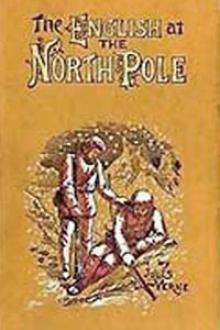The World of Ice - Robert Michael Ballantyne (best selling autobiographies TXT) 📗

- Author: Robert Michael Ballantyne
Book online «The World of Ice - Robert Michael Ballantyne (best selling autobiographies TXT) 📗». Author Robert Michael Ballantyne
The first impulse of the men was to give three cheers, but Bolton checked them in the bud.
"No, no, lads. Ye must hold on," he said, in an eager but subdued voice. "Doubtless it would be pleasant to vent our feelings in a hearty cheer, but it would startle the old gentleman inside. Get along with you, and let us get ready a good supper."
"O morther!" exclaimed O'Riley, holding on to his sides as if he believed what he said, "me biler'll bust av ye don't let me screech."
"Squeeze down the safety-valve a bit longer, then," cried Bolton, as they hurried along with the whole population to the outskirts of the village. "Now, then, ye may fire away, they won't hear ye--huzza!"
A long enthusiastic cheer instantly burst from the sailors, and was immediately followed by a howl of delight from the Esquimaux, who capered round their visitors with uncouth gestures and grinning faces.
Entering one of the largest huts, preparations for supper were promptly begun. The Esquimaux happened to be well supplied with walrus-flesh, so the lamps were replenished, and the hiss of the frying steaks and dropping fat speedily rose above all other sounds.
Meanwhile, Fred and his father, having mutually recovered somewhat of their wonted composure, began to tell each other the details of their adventures since they last met, while the former prepared a cup of coffee and a steak for their mutual comfort.
"But, father," said Fred, busying himself at the lamp, "you have not yet told me how you came here, and what has become of the _Pole Star_, and how it was that one of your men came to be buried in the Esquimau fashion, and how you got your leg broken."
"Truly, Fred, I have not told you all that, and to give it you all in detail will afford us many a long hour of converse hereafter, if it please God, whose tenderness and watchful care of me has never failed. But I can give you a brief outline of it thus:--
"I got into Baffin's Bay and made a good fishing of it the first year, but was beset in the ice, and compelled to spend two winters in these regions. The third year we were liberated, and had almost got fairly on our homeward voyage when a storm blew us to the north and carried us up here. Then our good brig was nipped and went to the bottom, and all the crew were lost except myself and one man. We succeeded in leaping from one piece of loose ice to another until we reached the solid floe and gained the land, where we were kindly received by the Esquimaux. But poor Wilson did not survive long. His constitution had never been robust, and he died of consumption a week after we landed. The Esquimaux buried him after their own fashion, and, as I afterwards found, had buried a plate and a spoon along with him. These, with several other articles, had been washed ashore from the wreck. Since then I have been living the life of an Esquimau, awaiting an opportunity of escape either by a ship making its appearance or a tribe of natives travelling south. I soon picked up their language, and was living in comparative comfort, when, during a sharp fight I chanced to have with a Polar bear, I fell and broke my leg. I have lain here for many months, and have suffered much, Fred; but, thank God, I am now almost well, and can walk a little, though not yet without pain."
"Dear father," said Fred, "how terribly you must have felt the want of kind hands to nurse you during those dreary months, and how lonely you must have been!"
"Nay, boy, not quite so lonely as you think. I have learned the truth of these words, 'I will never leave thee, nor forsake thee'--'Call upon Me in the time of trouble, and I will deliver thee.' This, Fred, has been my chief comfort during the long hours of sickness."
Captain Ellice drew forth a soiled pocket Bible from his breast as he spoke.
"It was your beloved mother's, Fred, and is the only thing I brought with me from the wreck; but it was the only thing in the brig I would not have exchanged for anything else on earth. Blessed Bible! It tells of Him whose goodness I once, in my ignorance, thought I knew, but whose love I have since been taught 'passeth knowledge.' It has been a glorious sun to me, which has never set in all the course of this long Arctic night. It has been a companion in my solitude, a comfort in my sorrows, and even now is an increase to my joy; for it tells me that if I commit my way unto the Lord, he will bring it to pass, and already I see the beginning of the end fulfilled."
Fred's eyes filled with tears as his father spoke; but he remained silent, for he knew that of late he had begun to neglect God's blessed Word, and his conscience smote him.
It were impossible here to enter minutely into the details of all that Captain Ellice related to Fred during the next few days, while they remained together in the Esquimau village. To tell of the dangers, the adventures, and the hair-breadth escapes that the crew of the _Pole Star_ went through before the vessel finally went down, would require a whole volume. We must pass it all over, and also the account of the few days that followed, during which sundry walruses were captured, and return to the _Dolphin_, to which Captain Ellice had been conveyed on the sledge, carefully wrapped up in deer-skins, and tended by Fred.
A party of the Esquimaux accompanied them, and as a number of the natives from the other village had returned with Saunders and his men to the ship, the scene she presented, when all parties were united, was exceedingly curious and animated.
The Esquimaux soon built quite a little town of snow-huts all round the _Dolphin_, and the noise of traffic and intercourse was peculiarly refreshing to the ears of those who had long been accustomed to the death-like stillness of an Arctic winter. The beneficial effect of the change on men and dogs was instantaneous. Their spirits rose at once, and this, with the ample supply of fresh meat that had been procured, soon began to drive scurvy away.
There was one dark spot, however, in this otherwise pleasant scene--one impending event that cast a gloom over all. In his narrow berth in the cabin Joseph West lay dying. Scurvy had acted more rapidly on his delicate frame than had been expected. Despite Tom Singleton's utmost efforts and skill, the fell disease gained the mastery, and it soon became evident that this hearty and excellent man was to be taken away from them.
During the last days of his illness, Captain Ellice was his greatest comfort and his constant companion. He read the Bible to him, and when doubts and fears arose, as they sometimes did, he pointed him to Jesus, and spoke of that love from which nothing could separate him.
It was on Christmas day that West died.
"O sir," said he to Captain Ellice just an hour before he breathed his last, "how much I regret the time that I have lost! How I wish now that I had devoted more of my precious time to the study of the Word and to prayer! How many opportunities of speaking a word for Jesus I have neglected. Once, everything seemed of importance; now, but _one_ thing is worthy of a thought."
"True," answered the captain, "'the one thing needful.' It is strange that we will scarce permit ourselves to think or speak of _that_ till we come to die. But you have thought on Jesus long ere now, have you not?"
"Yes," answered West faintly, "I have; but I take no comfort from that thought. When I think of my past life it is only with regret. My hope is in the Lord. What I have been, or might have been, is nothing. One thing I know--I _am_ a sinner; and this I also know--'Christ Jesus came into the world to save sinners!'"
These were the last words the dying man spoke. Shortly after, he fell asleep.
Next day the body of Joseph West was put in a plain deal coffin, and conveyed to Store Island, where it was placed on the ground. They had no instruments that could penetrate the hard rock, so were obliged to construct a tomb of stones, after the manner of the Esquimaux, under which the coffin was laid and left in solitude.
New-Year's day came, and preparations were made to celebrate the day with the usual festivities. But the recent death had affected the crew too deeply to allow them to indulge in the unrestrained hilarity of that season. Prayers were read in the morning, and both Captain Guy and Captain Ellice addressed the men feelingly in allusion to their late shipmate's death and their own present position. A good dinner was also prepared, and several luxuries served out, among which were the materials for the construction of a large plum-pudding. But no grog was allowed, and they needed it not. As the afternoon advanced, stories were told, and even songs were sung; but these were of a quiet kind, and the men seemed, from an innate feeling of propriety, to suit them to the occasion. Old friends were recalled, and old familiar scenes described. The hearths of home were spoken of with a depth of feeling that showed how intense was the longing to be seated round them again, and future prospects were canvassed with keen interest and with hopeful voices. New-Year's day came and went, and when it was gone the men of the _Dolphin_ did not say, "what a jolly day it was." They _said_ little or nothing, but long after they _thought_ of it as a bright spot in their dreary winter in the Bay of Mercy--as a day in which they had enjoyed earnest, glad, and sober communings of heart.
CHAPTER XXI.
First gleam of light--Trip to welcome the sun--Bears and strange discoveries--O'Riley is reckless--First view of the sun.
The wisest of men has told us that "it is a pleasant thing for the eyes to behold the sun," but only those who spend a winter in the Arctic Regions can fully appreciate the import of that inspired saying.
It is absolutely essential to existence that the bright beams of the great luminary should fall on animal as well as plant. Most of the poor dogs died for want of this blessed light, and had it been much longer withheld, doubtless our navigators would have sunk also.
About the 20th of January a faint gleam of light on the horizon told of the coming day. It was hailed with rapture, and long before the bright sun himself appeared on the southern horizon the most of the men made daily excursions to the neighbouring hilltops to catch sight of as much as possible of his faint rays. Day by day those rays expanded, and at last a sort of _dawn_ enlightened a distant portion of their earth, which, faint though it was at first, had much the appearance in their eyes of a bright day. But time wore on, and _real_ day appeared. The red sun





Comments (0)